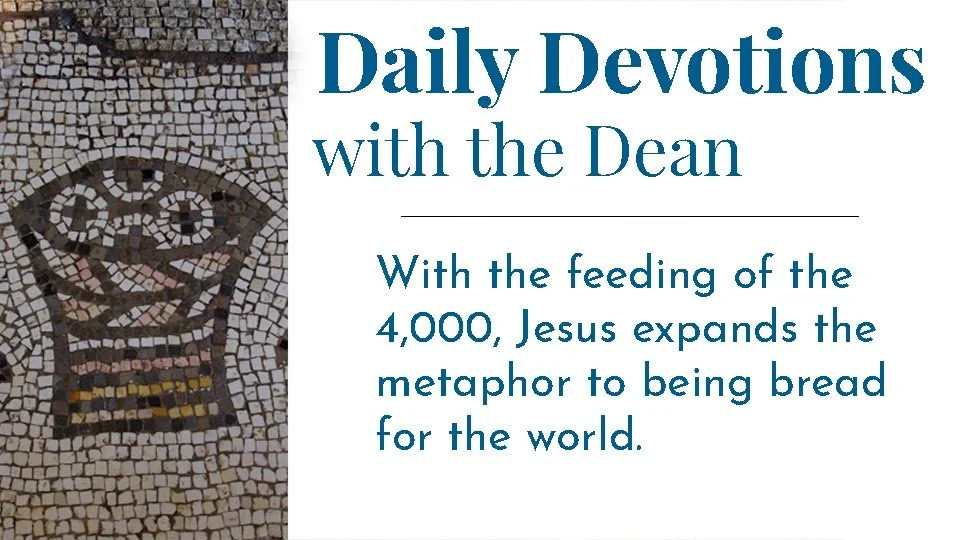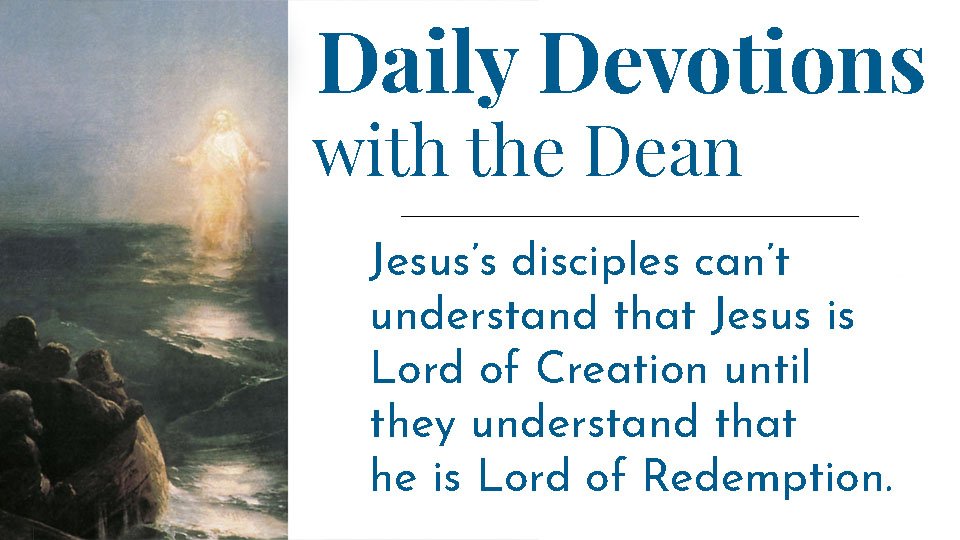Thursday • 2/2/2023 •
Week of 4 Epiphany
This morning’s Scriptures are: Psalm 70; Psalm 71; Isaiah 55:1–13; Galatians 5:1–15; Mark 8:27–9:1
This morning’s Canticles are: following the OT reading, Canticle 8 (“The Song of Moses,” Exodus 15, BCP, p. 85); following the Epistle reading, Canticle 19 (“The Song of the Redeemed,” Revelation 15:3–4, BCP, p. 94)
Welcome to Daily Office Devotions, where every Monday through Friday we consider some aspect of that day’s Scripture readings, as given in the Book of Common Prayer. I’m Reggie Kidd, and I’m grateful to be with you. This is Thursday of the fourth week of Epiphany, the “manifestation” of God’s glory in Jesus Christ.
“For freedom Christ has set us free.” — Galatians 5:1. Different aspects of the Bible’s theme of “freedom” converge in an unusually rich fashion in today’s readings in Isaiah and Galatians.
Free to eat. Back in chapter 25, Isaiah had prophesied the day when, at the end of time, God will host a feast of the richest food and finest wine. In the present, Isaiah says here in chapter 55, daily fare is offered: wine, milk, bread, rich food. Its cost? Nothing. “Come, buy wine and milk without money and without price” (Isaiah 55:1). God is a generous host. It’s hard not to see here a forecast of Jesus who declares himself “Bread from Heaven,” who feeds the multitudes during his earthly ministry, and now feeds his followers from his place as ascended Lord of the Eucharistic Feast. Come! Buy! It’s Free!
Image: "Dinner at Buenos Aires Café in Austin, Texas" by vxla is licensed under CC BY 2.0
Free to understand. To many of us, the Bible is a closed book until something happens to open it up to us. However we get there—responding to a knock on a dorm room door, picking up a hotel room Gideon’s Bible—what we experience is that God’s book begins to speak with uncanny power. Isaiah says God’s Word does not return to him empty, “but it shall accomplish that which I purpose, and succeed in the thing for which I sent it” (Isaiah 55:11). God be praised for speaking into our lives, and for the free gift of the capacity to understand!
Free to say, “I’m pardoned!” At the bottom of so many of our social pathologies, relational dysfunctions, and feelings of personal inadequacy is a debilitating sense of guilt or shame. We know we have violated whatever code we grew up with. We sense that if people knew our darkest secrets, they would shun us. Until, that is, someone with the authority to do so says, “All is forgiven. I have covered your guilt. I have taken away your shame.” Isaiah’s word of grace to the “unrighteous” and the “wicked” is: “let them return to the Lord, that he may have mercy on them, and to our God, for he will abundantly pardon” (Isaiah 55:7). God doesn’t reckon accounts the way others do; not the way our own consciences do. That’s what Isaiah means when he continues, “For my thoughts are not your thoughts, nor are your ways my ways, says the Lord” (Isaiah 55:8). With him pardon is abundant, and mercy is free!
Free to sing. Praise pours forth from the hearts of those who have been set free from guilt and shame. It’s almost as though we hear creation singing along with us. “For you shall go out in joy, and be led back in peace; the mountains and the hills before you shall burst into song, and all the trees of the field shall clap their hands” (Isaiah 55:12).
Free to say, “No!” Paul means it when he says, “For freedom Christ has set us free” (Galatians 5:1). We are free to resist false imperatives that would make us live as though we were still subject to punishment for guilt or embarrassment at shame. Christ sets us free from demands of self-immolation, self-punishment, extra-curricular acts of obedience, and burdensome human-made disciplines. The reason for Paul’s agony of soul in his letter to the Galatians is that he fears these believers will succumb to just such demands. If they do, he knows they will lose all the joy that Christ has for them.
Free not to indulge the flesh. Submitting to the knife of circumcision will undo the unique, once-for-all shedding of Christ’s blood that alone can bring freedom from sin’s condemnation. “Listen! I, Paul, am telling you that if you let yourselves be circumcised, Christ will be of no benefit to you” (Galatians 5:2). Further, that seemingly super-obedient act of (literally) punishing oneself in the flesh will actually awaken desires of the flesh. Church history has proven Paul right time and again: legalism leads to license. Moralism leads to moral failure. “You were called to freedom, brothers and sisters” … a freedom not “to indulge your flesh” (Galatians 5:13a,c).
Free not to savage my brothers and sisters. And legalism and moralism lead to lovelessness. There’s a profound relational reason why Paul warns the Galatians not to undergo the knife of circumcision: they will turn right around and (metaphorically) take the blade to one another. “If, however, you bite and devour one another, take care that you are not consumed by one another” (Galatians 5:15). That’s always, always, always the way that grace-abandoning legalism works.
Free to love and free to serve. The reason that Christ underwent the curse of the law for us was so that a deeper purpose of the law could find fulfillment in our lives. When the Bible stops threatening us with death and condemnation (since they’ve been borne by Another!), the Bible begins to show us how to love the Lord our God with all our heart and soul and mind and strength, and how to love our neighbors as ourselves (Mark 12:30–31; Deuteronomy 6:5; Leviticus 19:18). That’s why as hard as Paul works to keep the Galatians from going back “under the law,” he works just as hard to show them the deeper point of the law: “…the only thing that counts is faith working through love. … through love become slaves to one another. For the whole law is summed up in a single commandment, ‘You shall love your neighbor as yourself’” (Galatians 5:6b,13b,14).
Live in that freedom, and be blessed this day,
Reggie Kidd+













